Can Green Tea Extract Help with Dissociative Brain Fog?
Introduction
When you’re living with dissociation, clarity can feel out of reach. You might wake up foggy, struggle to focus, or feel mentally “numb” — like your thoughts are wrapped in cotton. This experience, often called dissociative brain fog, is more than just distraction or fatigue. It’s a reflection of how trauma and chronic stress affect your brain chemistry, inflammation, and energy production.
The good news is that certain natural compounds can help restore cognitive sharpness and calm awareness. One of the most promising? Green tea extract, particularly for its powerful antioxidant and neuroprotective effects.
Green tea extract contains L-theanine, EGCG (epigallocatechin gallate), and other bioactive molecules that support focus, reduce inflammation, and modulate neurotransmitters — all key mechanisms for lifting dissociative fog and promoting mind–body reconnection.
In this article, we’ll explore how dissociation disrupts cognitive function, how green tea extract supports brain health, and what the science says about its ability to enhance focus, energy, and emotional presence 🌿.
Looking for supplements for This? Click here.
What Dissociative Brain Fog Feels Like 🌫️

People experiencing dissociation often describe their minds as “slow,” “disconnected,” or “blank.” It’s not laziness or lack of intelligence — it’s a neurobiological freeze response.
When the body perceives chronic threat or overwhelm, it shifts into survival mode, redirecting blood flow and energy away from higher brain regions (like the prefrontal cortex) toward more primitive structures (like the brainstem). This makes it harder to concentrate, plan, or feel emotionally present.
Physiologically, this means:
Reduced oxygen and glucose flow to the brain
Low mitochondrial activity (less energy at the cellular level)
Neurotransmitter imbalances (especially dopamine and acetylcholine)
Chronic low-grade inflammation
Over time, this combination creates the “fog” — mental fatigue, forgetfulness, and difficulty staying connected to reality.
To lift this fog, we must help the brain reawaken — gently, not forcefully. That’s where green tea extract shines.
The Power of Green Tea Extract 🍃
Green tea extract is derived from the leaves of Camellia sinensis, the same plant used for green, black, and white tea. It’s rich in catechins, a class of polyphenols with strong antioxidant and anti-inflammatory properties. The most studied and potent of these is EGCG (epigallocatechin gallate).
In addition to EGCG, green tea contains L-theanine, an amino acid known for its calming yet focusing effects. Together, these compounds form a natural synergy that enhances mental performance while reducing stress — a perfect match for the unique challenges of dissociative brain fog.
How Green Tea Extract Supports the Brain 🧠✨
Let’s break down how the key components of green tea extract interact with the body and brain to promote clarity and connection.
L-Theanine: Calm Focus and Emotional Regulation
L-theanine increases alpha brain waves, which are associated with relaxed alertness — the same state achieved through meditation or mindful breathing. This is especially important for dissociation, where the mind swings between hyperarousal (anxiety) and hypoarousal (shutdown).
By promoting alpha activity, L-theanine helps the brain settle into a balanced state where calm awareness becomes possible.
It also supports GABA, dopamine, and serotonin — the neurotransmitters that regulate mood, motivation, and emotional stability. In trauma recovery, stabilizing these chemicals can help prevent the sudden shifts between numbness and overwhelm.
Studies show that L-theanine can:
Reduce anxiety without sedation
Improve attention and working memory
Enhance alpha-wave coherence between brain hemispheres (supporting integration)
For those struggling with dissociative fog, this can mean feeling more “here,” less detached, and better able to process information calmly.
EGCG: The Inflammation Fighter 🔥
EGCG is one of the most powerful antioxidants found in nature. It neutralizes free radicals, reduces neuroinflammation, and protects neurons from oxidative stress — all of which contribute to cognitive sluggishness in dissociation.
Neuroinflammation is one of the hidden drivers of dissociative symptoms. When the brain’s immune cells (microglia) become chronically activated by stress or trauma, they release inflammatory molecules that disrupt neurotransmitter function and slow synaptic communication.
EGCG calms these microglia and downregulates inflammatory cytokines like IL-6 and TNF-alpha. It also increases Brain-Derived Neurotrophic Factor (BDNF), a protein that supports neuron growth and neuroplasticity — the brain’s ability to rewire and heal after trauma.
This combination of anti-inflammatory and neuro-regenerative effects helps restore cognitive clarity, memory, and emotional resilience.
Supporting Mitochondrial Energy ⚙️
Dissociative fatigue often stems from mitochondrial dysfunction — the brain’s energy factories aren’t producing enough ATP. EGCG helps by improving mitochondrial efficiency and protecting these tiny powerhouses from oxidative damage.
When ATP levels rise, neurons communicate more effectively, cognitive speed improves, and that “foggy” detachment begins to lift.
Green tea’s polyphenols also enhance cerebral blood flow, delivering more oxygen and nutrients to the brain. This can feel like turning the lights back on — your thoughts become more fluid, your attention sharper, and your awareness grounded in the present moment again.
Balancing Dopamine and Acetylcholine 🧩
Brain fog isn’t just about energy — it’s about chemistry. Low dopamine leads to low motivation, while acetylcholine (the neurotransmitter of learning and attention) often declines under chronic stress.
EGCG and L-theanine both support dopamine release and acetylcholine sensitivity, helping restore the brain’s ability to focus and engage.
This balance between calm (GABA/serotonin) and drive (dopamine/acetylcholine) is exactly what the dissociative brain needs — not stimulation, but coherence.
Looking for supplements for This? Click here.
The Stress Connection: Cortisol and the HPA Axis 🌙
Chronic stress keeps the HPA axis (hypothalamic-pituitary-adrenal system) overactivated, releasing cortisol day after day. High cortisol impairs hippocampal function, shrinking the very brain regions responsible for memory and emotional regulation.
Green tea extract helps regulate this system. EGCG lowers cortisol levels while increasing resilience to future stressors. L-theanine reinforces this by lowering heart rate and blood pressure during stressful events, creating a biological feedback of safety.
When cortisol normalizes, the brain can finally shift from survival to presence — the essential transition for reducing dissociative symptoms.
The Gut–Brain Connection: Green Tea and Microbiome Health 🌿
Surprisingly, green tea also supports mental clarity through your gut. The gut and brain communicate via the vagus nerve and through signaling molecules produced by gut bacteria.
EGCG promotes the growth of beneficial microbes like Bifidobacterium and Lactobacillus, while suppressing harmful species that contribute to inflammation.
These changes in the microbiome improve serotonin production, reduce systemic inflammation, and enhance vagal tone — all of which make it easier to stay calm, connected, and cognitively clear.
In other words, green tea doesn’t just work in the brain — it creates harmony along the entire gut–brain axis.
How Green Tea Differs from Caffeine ☕

Many people assume that green tea extract is just a stimulant, but it’s actually much more sophisticated. While it does contain small amounts of caffeine, its effects are tempered by L-theanine, which smooths out stimulation and prevents jitters.
Instead of the sharp, anxious spike of coffee, green tea provides focused calm — alertness without anxiety.
For those with trauma-related dissociation, this balance is ideal. You get energy and clarity without pushing your nervous system into hyperarousal.
Research Highlights 🔬
A 2017 study in Nutrients found that green tea extract improved working memory and reaction time while reducing mental fatigue.
A 2019 meta-analysis in Phytotherapy Research confirmed that L-theanine enhances attention and cognitive flexibility, particularly under stress.
A 2018 paper in Frontiers in Nutrition reported that EGCG protects neurons from oxidative stress and supports long-term brain health through its anti-inflammatory actions.
Clinical trials also show that combining L-theanine with caffeine improves focus and accuracy without overstimulation, especially in individuals experiencing stress-induced cognitive impairment.
These results suggest that green tea extract can target several of the biological roots of dissociative fog — from inflammation and energy loss to neurotransmitter imbalance.
How to Use Green Tea Extract Safely 🍵
Green tea extract is available in capsules, powders, and teas. While regular green tea is beneficial, supplements offer standardized doses of EGCG and L-theanine for consistent results.
A typical dosage range for cognitive and mood support is:
EGCG: 200–400 mg per day
L-theanine: 100–200 mg per day
It’s best taken in the morning or early afternoon to enhance focus without interfering with sleep. Always start with a lower dose and increase gradually as your body adapts.
Because EGCG can be potent, take it with food to avoid stomach irritation. Avoid combining with stimulant-heavy supplements or large caffeine doses.
Combining Green Tea Extract with Other Supportive Nutrients 🌸
For a more complete anti-fog strategy, green tea extract pairs well with other nutrients that support brain energy and emotional regulation:
Magnesium Glycinate helps regulate GABA receptors, enhancing the calming effects of L-theanine.
CoQ10 boosts mitochondrial energy, complementing EGCG’s protective action.
Omega-3 fatty acids enhance neuronal membrane fluidity and reduce inflammation.
B Vitamins (especially B6, B9, and B12) support neurotransmitter synthesis and myelin repair.
Together, these nutrients create a powerful stack for reawakening mental clarity and grounded awareness.
Looking for supplements for This? Click here.
A Mindful Ritual, Not Just a Supplement 🌿
One of the most beautiful things about green tea is its history as a mindfulness ritual. For centuries, monks have used it to sustain focus during meditation — awake, calm, and present.
You can recreate that ritual for dissociative healing. When you sip green tea or take your supplement, slow down. Breathe in its earthy aroma. Feel warmth spreading through your body. This sensory awareness helps retrain your nervous system to associate stillness with safety.
By turning supplementation into mindfulness, you multiply its effects — both biochemical and emotional.
Want to try Breathwork? Click Here.
What You Might Notice 🌤️
With consistent use, many people describe subtle but meaningful changes:
A lighter mental state, as if a fog has lifted
Better focus and word recall
More emotional presence without overwhelm
Steadier energy throughout the day
Easier grounding during stressful moments
These improvements may build gradually over weeks as inflammation decreases and neurotransmitter balance restores. Think of it not as stimulation but as illumination — helping the brain remember what clarity feels like.
Safety and Precautions ⚠️
Green tea extract is generally safe for most people when taken within recommended ranges. However, high doses (above 800 mg EGCG daily) can stress the liver. Always choose high-quality supplements tested for purity.
If you’re sensitive to caffeine, start with lower doses or look for decaffeinated green tea extract.
Avoid combining with anticoagulant medications, thyroid medication, or certain antidepressants without medical supervision, as catechins can interact with drug metabolism.
Pregnant or nursing individuals should consult a healthcare provider before use.
From Fog to Focus 🌿💡
Dissociation doesn’t mean your mind is broken — it means it’s protecting you. Green tea extract helps bring that mind back online gently, by supporting the chemistry of safety, energy, and awareness.
L-theanine steadies the waves. EGCG clears the static. Together, they help rebuild the conditions for clarity — where you can think, feel, and exist fully again.
Over time, your brain learns a new rhythm: alert but peaceful, focused yet grounded. The fog lifts not through force, but through nourishment.
That’s the true power of green tea extract — not just a supplement, but a bridge between survival and presence 🍵🧘
Looking for online therapy ? Click Here.
References
Unno, K., et al. (2017). “Theanine and catechins in green tea enhance cognitive performance and reduce stress.” Nutrients, 9(5): 475.
Camfield, D. A., et al. (2014). “The acute effects of green tea and L-theanine on cognitive function.” Nutritional Neuroscience, 17(4): 193–200.
Mancini, A., et al. (2018). “EGCG: Neuroprotective potential and mechanisms.” Frontiers in Nutrition, 5: 84.
Vauzour, D., et al. (2008). “The neuroprotective role of polyphenols in aging and neurodegeneration.” Nutrition Reviews, 66(8): 511–523.
Panahi, Y., et al. (2016). “Green tea extract and oxidative stress.” Complementary Therapies in Medicine, 29: 1–7.
Kennedy, D. O. (2016). “Polyphenols and cognitive function.” Advances in Nutrition, 7(4): 730–740.
Lanius, R. A., et al. (2018). The Neurobiology and Treatment of Trauma-Related Dissociation. Routledge.
van der Kolk, B. A. (2014). The Body Keeps the Score. Viking.
Esposito, E., & Cuzzocrea, S. (2010). “Antioxidant therapy in neuroinflammation.” Neurochemical Research, 35(8): 1410–1421.
Gerbarg, P. L., & Brown, R. P. (2016). “Mind-body practices and cellular recovery after trauma.” Annals of the New York Academy of Sciences, 1373(1): 66–77.
Related Posts
-

Why Co-Dependency Feels Draining: Adrenal Fatigue and Supplements That Help
The adrenal glands are small but powerful organs that sit above your kidneys, acting as your body’s built-in stress managers. They produce hormones like cortisol and adrenaline that help regulate energy, mood, and resilience. When they’re overworked from chronic stress or emotional exhaustion, fatigue and imbalance follow. Supporting adrenal health naturally can help restore calm, energy, and hormonal balance. 🌿⚡
-

The Link Between Anxiety, Co-Dependency, and Natural Support
Anxiety feels like living in constant alert mode—your heart races, your thoughts loop, and your body can’t find peace. It’s the nervous system’s way of preparing for danger, even when none exists. Understanding what’s happening in your mind and body is the first step toward calming the storm and restoring balance. 🌿💫
-

Supplements That Support Dopamine and Serotonin in Co-Dependent Patterns
Serotonin is the neurotransmitter of calm, confidence, and contentment. When it’s balanced, you feel peaceful and emotionally grounded. When it’s low, anxiety, mood swings, and emotional dependence take over. By understanding serotonin’s role in emotional health—and how to support it naturally—you can rebuild inner stability, improve relationships, and cultivate lasting happiness from within. 🌞💫
-

How Emotional Exhaustion in Codependency Impacts the Nervous System
The nervous system is the body’s communication network, connecting the brain to every organ and muscle. It regulates stress, mood, and emotion through a delicate balance of electrical and chemical signals. When overwhelmed, it can become dysregulated—leading to fatigue, anxiety, and emotional imbalance. Understanding how to calm and strengthen the nervous system is key to healing from chronic stress and emotional burnout. ⚡🌿
-

What Is Co-Dependency? The Role of Brain Chemistry and Stress
Stress is more than a feeling—it’s a full-body experience that begins in the brain and ripples through every cell. When cortisol surges and the nervous system stays on alert, your body can’t rest or recover. Over time, this constant tension affects energy, focus, mood, and even immune health. Understanding stress chemistry is the first step toward breaking free from burnout and finding calm again. 🌿
-

Creating a Supplement Stack for Motivation, Energy, and Anti-Procrastination
Motivation is the fuel behind every meaningful achievement—but it’s not just about willpower. It’s a mix of mindset, brain chemistry, and momentum. When energy, focus, and purpose align, action feels natural instead of forced. Learn how to harness motivation as a daily state, not a fleeting feeling.
-

Supplements for Building Consistency and Reducing Chronic Procrastination
Biochemistry is the bridge between biology and chemistry—the science of life at the molecular level. It explains how nutrients, hormones, and neurotransmitters interact to create energy, thought, and emotion. From brain function to muscle movement, biochemistry reveals the invisible processes that sustain health, balance, and vitality.
-

GABA and Procrastination: Supporting Calm Focus for Productivity
GABA is the brain’s natural calming messenger—a neurotransmitter that helps slow mental overactivity and ease stress. When GABA levels drop, focus fades, anxiety rises, and procrastination becomes more likely. By supporting GABA through nutrition, lifestyle, and supplements, you can restore calm clarity, improve focus, and take action with steady, balanced energy.
-

Ashwagandha and Procrastination: Lowering Stress to Improve Action
Science is the language of curiosity and discovery. It helps us understand the hidden patterns behind life, energy, and the universe. Through experimentation and critical thinking, science connects imagination to evidence—turning questions into knowledge. Whether through microscopes, molecules, or minds at work, science represents our endless pursuit of truth and innovation.
-

Neurotransmitters and Motivation: Supplements That Support Drive and Focus
Supplements can do more than boost physical health—they can also enhance mental clarity, focus, and motivation. Nutrients like omega-3s, magnesium, B vitamins, and adaptogens help balance neurotransmitters, stabilize mood, and support brain energy. When combined with good sleep, nutrition, and mindful habits, they can transform how your brain performs under stress.
-

How Stress Hormones Like Cortisol Fuel Procrastination (and What Helps)
Blood sugar isn’t just about physical health—it directly impacts focus, mood, and motivation. When glucose levels spike and crash, energy and attention do the same, fueling procrastination and brain fog. Learning how to stabilize blood sugar through balanced meals, mindful habits, and key nutrients helps keep your mind steady, focused, and ready to act.
-

Brain Fog and Procrastination: Supplements for Mental Clarity
Brain fog can turn even simple tasks into mental hurdles. When your thoughts feel slow and unclear, procrastination often follows—making focus and productivity seem impossible. This article explores the biochemical and lifestyle causes of brain fog and reveals the most effective supplements for restoring mental clarity, focus, and sustained energy.
-

The Link Between Low Energy and Procrastination: Can Supplements Help?
Neurochemistry shapes how we think, feel, and act. When neurotransmitters like dopamine, serotonin, and GABA fall out of balance, it can lead to fatigue, anxiety, or lack of motivation—fueling procrastination and low mood. Understanding the brain’s chemical communication system helps us find ways to restore focus, calm, and emotional stability through nutrition, mindfulness, and targeted supplements.
-

Why Do We Procrastinate? The Role of Dopamine and Supplements That Support It
Dopamine is the brain’s motivation messenger—the chemical that fuels focus, reward, and drive. When dopamine levels drop, even simple tasks can feel impossible to start. This article explores how dopamine shapes procrastination, motivation, and mental energy, along with natural supplements and daily habits that help restore balance and get things done.
-

Phosphatidylserine and Stress Reduction for People with BDD
Stress is more than a mental state—it’s a full-body experience that affects hormones, brain chemistry, and emotional balance. For people with Body Dysmorphic Disorder (BDD), constant tension and worry about appearance can overload the nervous system. Learning how stress works and finding ways to calm it is key to breaking the cycle of anxiety and self-criticism.
-

How Antioxidants Like Vitamin C & E Support Mental Health in BDD
Antioxidants are the body’s natural defense against stress and inflammation. For people with Body Dysmorphic Disorder (BDD), oxidative stress can worsen fatigue, anxiety, and emotional imbalance. Nutrients like Vitamin C and E help protect brain cells, boost neurotransmitter function, and support a calmer, clearer mindset—building a stronger foundation for recovery.
-

Ginkgo Biloba and Memory Support for BDD Recovery
Emotional regulation is the foundation of healing from Body Dysmorphic Disorder (BDD). When the nervous system stays in constant overdrive, even small stressors can trigger self-critical spirals. Learning to calm emotional reactivity helps restore clarity, confidence, and a sense of inner balance. By blending mindfulness, nervous system support, and self-compassion, you can retrain your brain to respond—not react—to emotion.
-

Alpha GPC and Cognitive Function in Body Dysmorphic Disorder
Mental fatigue can feel like your brain has hit a wall—thoughts slow down, focus fades, and motivation disappears. For people with Body Dysmorphic Disorder (BDD), chronic overthinking, emotional stress, and constant self-evaluation can deplete mental energy even further. Understanding what causes this cognitive exhaustion is the first step toward recovery—through rest, balanced nutrition, and targeted brain-supporting supplements.
-

N-Acetyl L-Tyrosine and BDD: Supporting Mental Clarity
Chronic stress doesn’t just affect your mood—it reshapes your brain chemistry, weakens focus, and fuels the obsessive thought loops common in Body Dysmorphic Disorder (BDD). Over time, constant cortisol elevation drains mental energy and emotional balance. Learning to recognize and manage chronic stress is essential to restoring mental clarity, self-compassion, and resilience.
-

Chamomile and Lavender for Calming Obsessive Body Image Thoughts
The nervous system is the command center of our emotional and physical world—and in Body Dysmorphic Disorder (BDD), it often operates in overdrive. Understanding how the brain and body communicate under stress reveals why intrusive thoughts feel uncontrollable. Learning to regulate the nervous system through calm practices, nutrition, and supplements helps restore inner balance and emotional safety.
-

Adaptogens for Body Dysmorphic Disorder: Rhodiola, Ginseng, and More
Rhodiola rosea, often called the “golden root,” is an adaptogenic herb renowned for boosting stress resilience and mental endurance. For individuals with Body Dysmorphic Disorder (BDD), Rhodiola may help reduce fatigue, regulate cortisol, and enhance emotional balance. By supporting both mind and body, this powerful plant promotes calm focus, improved mood, and renewed energy to face daily challenges.
-

B Vitamins for Stress Resilience in BDD: Rebuilding Calm from Within
Biochemistry is at the heart of every thought, emotion, and reaction we experience. In Body Dysmorphic Disorder (BDD), chemical imbalances in neurotransmitters like serotonin, dopamine, and GABA can amplify stress and distort self-perception. Understanding the biochemistry behind mood and stress regulation offers a path toward healing—bridging the gap between emotional experience and the body’s molecular balance.
-

Melatonin and Body Dysmorphic Disorder: Restoring Healthy Sleep Patterns
Melatonin, the body’s natural sleep hormone, plays a vital role in helping people with Body Dysmorphic Disorder (BDD) restore healthy sleep cycles. When anxiety and obsessive thinking interfere with rest, melatonin levels often drop, leading to more emotional reactivity and distorted self-perception. This article explores how melatonin works, why BDD disrupts it, and how natural supplementation—combined with mindful routines—can help the brain and body finally find calm at night.
-

Sleep Struggles with BDD: Supplements for Rest and Recovery
When you’re living with Body Dysmorphic Disorder (BDD), restful sleep can feel impossible—but the right supplements can help reset your body’s natural rhythm. From magnesium and L-theanine to 5-HTP and ashwagandha, these nutrients support relaxation, lower cortisol, and enhance melatonin production. This article explores how supplements can calm the mind, ease nighttime anxiety, and promote true restorative sleep for emotional and physical recovery.
-

5-HTP and Serotonin Balance: Could It Help with Body Dysmorphic Disorder?
Anxiety can feel like a storm inside the mind—restless, overwhelming, and hard to control. In people with Body Dysmorphic Disorder (BDD), anxiety often fuels obsessive thoughts and self-criticism, creating a painful cycle of worry and self-doubt. This article explores the biological roots of anxiety, the role of neurotransmitters like serotonin and GABA, and how natural strategies such as mindfulness, supplements, and nervous system regulation can restore calm and mental clarity.
-

Can Ashwagandha Help Ease Stress and Anxiety in Body Dysmorphic Disorder?
Neurotransmitters like serotonin, dopamine, GABA, and acetylcholine are the chemical messengers that shape how we think, feel, and react to stress. In Body Dysmorphic Disorder (BDD), imbalances in these neurotransmitters can amplify anxiety, obsessive thinking, and emotional distress. This article explores how restoring healthy brain chemistry through nutrition, supplements, and mindfulness can help bring clarity, calm, and emotional stability.
-

L-Theanine for BDD: Finding Calm in the Mind
Neurochemistry plays a central role in how we think, feel, and see ourselves. For those living with Body Dysmorphic Disorder (BDD), imbalances in neurotransmitters like serotonin, dopamine, and GABA can intensify anxiety, obsessive thoughts, and emotional distress. This article explores how regulating brain chemistry through supplements, mindfulness, and lifestyle changes can bring the nervous system back into harmony and restore inner calm.
-

Omega-3 Fatty Acids and Body Image Disorders: Supporting Emotional Health
Omega-3 fatty acids do far more than support heart health—they nourish the brain, stabilize mood, and may ease the emotional turbulence tied to body image disorders like BDD. This in-depth article explores how omega-3s regulate serotonin, dopamine, and inflammation, helping individuals reduce obsessive thoughts and rebuild self-acceptance. It also connects nutrition to therapy, mindfulness, and nervous system balance for holistic emotional healing.
-

Magnesium and BDD: Calming an Overactive Nervous System
Magnesium plays a crucial role in calming an overactive nervous system—something people with Body Dysmorphic Disorder (BDD) struggle with daily. This article explores how magnesium supports relaxation, emotional regulation, and stress reduction while diving into the science behind its connection to brain chemistry. It also examines how combining magnesium supplementation with therapy and breathwork can help rebalance the body’s stress response, reduce obsessive thought patterns, and promote lasting nervous system calm.
-

The Gut-Brain Axis and BDD: Why Probiotics Might Matter
The gut and brain are constantly in conversation — and that dialogue may shape how you experience Body Dysmorphic Disorder. By nurturing your microbiome with probiotics, prebiotics, and gut-healing nutrients, you can help rebalance serotonin, calm anxiety, and restore emotional stability from within 🧠🦠.
-
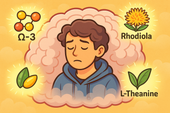
Brain Fog and Body Dysmorphic Disorder: Can Nootropic Supplements Help?
Brain fog often accompanies Body Dysmorphic Disorder, clouding focus and deepening emotional fatigue. Nootropic supplements like L-theanine, Rhodiola, and CoQ10 can help restore mental clarity, balance neurotransmitters, and bring calm energy back to the mind 🌿🧠.
-

How Stress Hormones Like Cortisol May Worsen Body Dysmorphic Disorder
Chronic stress floods the brain with cortisol — the hormone that keeps you on high alert. In Body Dysmorphic Disorder, this chemical overdrive fuels anxiety, distorts self-image, and traps the body in survival mode. Calming cortisol helps restore both peace and perspective 🌿🧠.
-

The Role of Neurotransmitters in BDD—and How Supplements May Help
Neurotransmitters like serotonin, dopamine, glutamate, and GABA shape how people with Body Dysmorphic Disorder perceive themselves. When these brain messengers fall out of balance, perception distorts — but targeted supplements can help restore calm, focus, and emotional regulation 🧠🌿.
-

What Is Body Dysmorphic Disorder? A Deeper Look at the Mind-Body Connection
Body Dysmorphic Disorder (BDD) isn’t just about appearance — it’s about perception. When brain chemistry, trauma, and stress distort self-image, the mind begins to see flaws that aren’t truly there. Healing starts by calming the nervous system and reconnecting mind and body 🪞🧠.
-
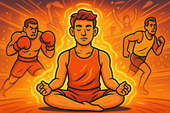
Keeping Calm in Competitive Sports: How to Train Your Mind, Body, and Chemistry for Peak Performance
Competitive pressure can overwhelm even the strongest athletes — but calm is trainable. By combining supplements like magnesium, L-theanine, and adaptogens with breathwork and mindset training, you can stay focused, balanced, and in control under any level of stress 🧠🏅.
-
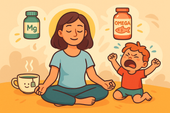
Supplements for Parents Facing Toddler Tantrums: Staying Calm When Little Emotions Run Wild
Toddler tantrums can drain even the most loving parent — but your calm is powerful. With the right supplements like magnesium, L-theanine, and ashwagandha supporting your nervous system, you can stay patient, grounded, and kind, even when emotions run high 🧸🌿.
-

Workplace Stress and Anger Management Support
Workplace stress can quickly turn into frustration — but calm is a skill you can train. By combining supplements like magnesium, L-theanine, and adaptogens with breathwork and mindset tools, you can stay focused, patient, and emotionally grounded no matter how intense the office gets 💼🌿.
-

How to Stay Patient With Family During Stressful Holidays
Holiday gatherings can stir up old stress and test your patience — but calm is possible. With nervous system support from magnesium, L-theanine, and adaptogens, plus mindful breathing and clear boundaries, you can stay centered, kind, and grounded even when family chaos unfolds 🎄💞.
-

Supplements to Keep Calm During Traffic Jams
Getting stuck in traffic doesn’t have to ruin your mood. With calming supplements like magnesium, L-theanine, and ashwagandha, you can train your body to stay relaxed and focused behind the wheel — turning gridlock into a moment of grounded patience 🚗🌿.
-
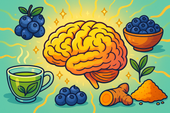
The Role of Antioxidants in Healing Brain Stress from Dissociation
Antioxidants protect the brain from the oxidative stress caused by trauma and dissociation. By neutralizing free radicals and supporting mitochondrial recovery, they help restore clarity, focus, and emotional balance — allowing the mind to heal at the cellular level 🌿🧠.
-
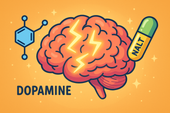
N-Acetyl L-Tyrosine (NALT) for Supporting Mental Clarity
N-Acetyl L-Tyrosine (NALT) fuels dopamine production — the neurotransmitter of focus and motivation. By supporting brain chemistry during stress, NALT helps restore mental clarity, energy, and alertness, making it easier to think clearly and feel present again ⚡🧠.
-

How Ginseng May Improve Focus and Energy in Dissociation
Ginseng helps combat the mental fatigue and fog that often come with dissociation. By supporting mitochondrial energy, balancing neurotransmitters, and regulating cortisol, it gently restores focus, motivation, and emotional presence — helping the mind reconnect with clarity and strength 🌿⚡.
-
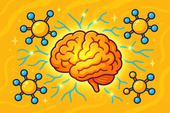
Phosphatidylserine and Dissociation: Supporting Cognitive Function
Phosphatidylserine helps calm the stress response by balancing cortisol, the body’s primary stress hormone. By lowering cortisol spikes, it protects memory, focus, and emotional stability — restoring clarity and mental presence for those struggling with dissociation 🧠🌿.
-
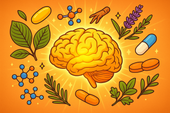
Building a Natural Supplement Stack for Dissociation Support
Building a supplement stack for dissociation means nourishing the brain and body back into communication. By supporting neurotransmitters, gut health, and energy balance through nutrients like magnesium, omega-3s, curcumin, and probiotics, you can help restore clarity, calm, and connection — one layer at a time 🌿🧠.
-

Chamomile and Lavender for Dissociative Anxiety Relief
Chamomile and lavender work together to calm dissociative anxiety by soothing the nervous system and restoring emotional safety. Their natural compounds balance cortisol, enhance GABA activity, and activate the vagus nerve — helping you feel grounded, connected, and at peace again 🌿💜.
-
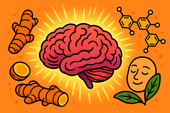
Curcumin for Inflammation and Mental Clarity in Dissociation
Curcumin, the golden compound in turmeric, does more than fight inflammation — it helps clear the mental fog often tied to dissociation. By calming neuroinflammation, balancing neurotransmitters, and supporting mitochondrial energy, curcumin can restore mental clarity, focus, and emotional presence 🌿🧠.
-
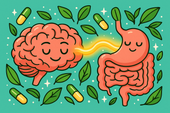
Probiotics and Dissociation: Exploring the Gut–Brain Axis
The gut–brain axis plays a vital role in emotional awareness and presence. When the microbiome is balanced, it supports serotonin production, vagus nerve activity, and calm focus. Probiotics help repair this connection — restoring safety, clarity, and the feeling of truly being in your body again 🌿🧠.
-
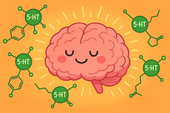
5-HTP for Dissociation: Supporting Serotonin and Emotional Stability
5-HTP helps bridge the gap between emotional numbness and stability by supporting serotonin production — the neurotransmitter that shapes mood, sleep, and sensory awareness. For people experiencing dissociation, 5-HTP may gently restore connection, presence, and emotional balance from the inside out 🌿🧠.
-
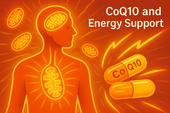
CoQ10 and Energy Support for People with Dissociation
Chronic dissociation often leaves the body running on empty — tired, foggy, and disconnected. CoQ10 helps recharge that system at the cellular level by restoring mitochondrial energy, reducing oxidative stress, and supporting the brain’s capacity to stay present. It’s energy medicine for both body and mind ⚡🧠.

















































